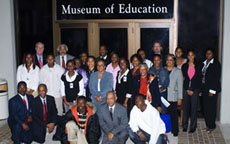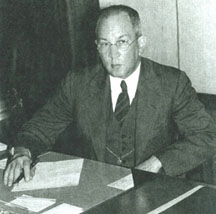

I. M. Terrell High School The Secondary School Study Web Exhibition |
||||||||||||||||
In 1940, I. M. Terrell High School was invited to participate in the Association of Colleges and Secondary Schools for Negroes’ Secondary School Study. Selected and funded by the Rockefeller Foundation, sixteen of the most distinguished black high schools in the United States participated in an experimental program to reexamine administrative, curricular, and instructional practices. The University of South Carolina’s Museum of Education is pleased to feature the Terrell High School and its participation in the study. |
||||||||||||||||
“The teachers truly cared about the students; that is why we learned so much. And at times they were more than teachers. They would sit us down and really talk to us. Yes, they were strict and firm, but we were never fearful. We knew what was right and what was wrong. When we did something wrong, the consequences were not just to punish us but to teach and help us learn.” |
||||||||||||||||
Letter of Invitation to Participate in the Study January 23, 1940 |
||||||||||||||||
|
||||||||||||||||
While the Association sought to achieve accreditation for its member schools and to make strides for equitable support—separate AND equal—for black education, some educators believed teachers were not involved in progressive education’s “stream of educational ideas” and, thus, were placing too much emphasis on traditional instructional practices. For this reason, the Rockefeller Foundation invited distinguished schools to help define promising practices and to serve as a laboratory for determining goals for black youth. |
||||||||||||||||
|
|
|||||||||||||||
With special thanks to Tom Kellam, Senior Librarian and City Archivist of the Fort Worth Public Library for his research assistance and thoughtfulness, and to Margie Majors for her great assistance and kindness in helping to obtain historical documents for this exhibition. |
||||||||||||||||
 “I. M. Terrell teachers were a distinguished group and, in terms of their credentials and classroom practices, they were the finest teachers in the county—white or black. The teachers received their degrees from outside of the state and brought a diversity of perspectives into the classroom.” Adelene L. James |
The Museum of Education’s Web Exhibitions center primarily on the academic life of individual schools during the 1940s and early 1950s, the focus of the Secondary School Study. Our vignettes serve not to lessen the accomplishments and accolades from prior or subsequent decades nor do they diminish the significance of the social and athletic dimensions of school life. Instead, the Museum presents web exhibitions of the Secondary School Study schools as a way to feature the experimental efforts of progressive educators during the 1940s. Since these vignettes were not prepared to serve as school histories, we encourage alumni and historians to prepare their own comprehensive school accounts, histories, and memoirs of these important educational institutions. |
|||||||||||||||
The Museum of Education’s Web Exhibitions have been prepared for a general audience and have not used professional terminology from the field of education. Our accounts are intentionally free of detailed bibliographic citations. The curator is currently writing a scholarly account of this project that follows accepted bibliographic practices. |
||||||||||||||||
| Further, these exhibitions are conceived within a tradition of progressive education where a fruitful experience raises as many questions as it answers. Thus, the information on the various sites has been crafted intentionally to be suggestive—to allow important questions "to float" through the exhibitions rather than to be answered with questionable certainty. These sites are works-in-progress and represent an "educational research charrette" as additional historical material is discovered and fresh memories, recollections, and insights come forth by participants and other researchers. | ||||||||||||||||
|
||||||||||||||||

an institutional member of the International Coalition of Sites of Conscience
curator@museumofeducation.info
















